Zhang Lei - Lessons from a Legend
The Chinese Self-Made Billionaire You Need to Know
Can you call a founder of a $60+ billion dollar private equity firm underrated?
I reckon you can. Because outside of China, I don’t think enough people know the story behind the notoriously media-shy Zhang Lei.
From an early life hustling at Zhumadian Station renting books out to bored passengers, earning the highest college entrance score in his province, trying life as a bricklayer on a construction site, to not only studying at Yale, but having investing legend David Swenson as a mentor, to now running one of Asia’s largest private equity firms.
Zhang Lei has lived a life most of us would be lucky to achieve in several lifetimes.
I hope I can do his story justice.
Early Life
Zhang Lei was born in 1972 in Zhumadian, a village in Henan province, in central China. Fair to say the Henan region and its people have some, strong perceptions shall we say. From an NYT article:
Henan has a P.R. problem, [...] It is not the prettiest part of China, to be sure.
But much worse, some people from other parts of China treat residents there with a disdain and mistrust that approaches racism. If you believe the slurs, Henan is crammed with thieves, ruffians, grifters and con artists. [...]
It prides itself on being the birthplace of the early dynasties that make it the “cradle of Chinese civilization.” But it is crowded, heavily rural and not as polished as coastal regions. The rough charms of the province are not for all travelers.
So Zhang from the get-go wasn’t some inner-city snob. His parents both worked full time and Zhang mentions that as a child of a dual-income family, one of the benefits was that there was no one in charge. So he would sneak out while his parents were away at work. Zhang was a sporty kid and while in elementary school, his grades were poor, he hated homework, and almost didn’t make the minimum admission score for junior high!
And even though he hated homework, Zhang had always loved reading books. And lucky for him, he had a relative that worked in the city library. So his parents would often give him off to this relative for the day. Given Zhang’s rebellious streak, his relative was afraid of Zhang running away, so they "locked" him in the library. And although he was naturally active, he enjoyed calming down and reading books all day in the library alone.
But business would enter Zhang Lei’s life when he was seven. As his parents lived next to a train station, he noticed a business opportunity to solve a pain point.
The trains on the Beijing-Guangzhou Line often stopped for a long time when they arrive at Zhumadian Station. So for the passengers waiting at the station, the best product he could offer was to eliminate boredom.
So Zhang mobilized his classmates to bring together books, comic strips and various magazines. Passengers would be able to borrow these for a fee. Zhang and his crew even started a "package service" - providing water and snacks when passengers would rent 5 books at once.
An early valuable lesson on product-market fit.
A love for learning
After his lessons in business and reading anything and everything he could find his hands on, he fell in love with deep thinking, logical reasoning, and decision-making.
So decided he would get his academic act together and work towards leaving his small town of Zhumadian, and attending the best university that he could.
Eventually, for his college entrance exams, he scored the highest marks in not just his school, but his entire province! Thus earning him a scholarship to Renmin University in Beijing.
But before attending college, in order to gain life experience, Zhang did work at a construction site and worked as a bricklayer for a month.
I always hope to understand the lives and situations of others with empathy, understand different life experiences, and understand this rich and changing world. In today’s investment practice, I still benefit from these rare growth experiences, because value investing is not mathematics or reasoning, and cannot be just a story. It must be like a field investigation in sociology to understand real production and life scenarios in order to truly grasp what it is
At Renmin University Zhang majored in international finance. And why’d he chosen that subject? He’d heard that this major has a high admission score and that there are foreign teachers teaching foreign languages.
But he dove head first into the topic and joined a securities club at Uni to further study the securities market and translate investing books.
He and a couple of other students organised a stock market simulation. The goal of the stock market simulation competition was to guide students to pay attention to the fundamentals of stocks and to explore the relationship between company performance and the rise and fall of stocks.
The simulation competition even ended up being broadcast on China Central Television and with actor Li Lingyu hosting it!
one of the most important things in life is to find someone you like and truly trustworthy to do fun together.
Life After Uni
After graduating in 1994 at the age of 22, there was a big decision to make: what job should Zhang choose?
At that time in China, the domestic financial market was underdeveloped, and there were very few securities and investment companies. Most of his fellow classmates chose to work in banks after graduation.
A common theme in his life, Zhang took a different approach. He chose to join China Minmetals Group, which was an odd choice but ended up being a great fit.
It gave him the perspective of a real working business, allowed him to meet colleagues with different educational backgrounds, perspectives, and insights, and gave him ample opportunities to travel for work and see South West Chinese provinces like Guizhou, Yunnan, Sichuan, and more.
To say Zhang loved it would be an understatement:
I can chat with colleagues or local friends on the road, about rare metals to local customs, and learn about a broader and more vivid society through them.
And slowly but surely, the allure of studying overseas began to grow on him. Zhang had many classmates and friends around who’d previously studied abroad. And ever the self-starter, he felt that he should go outside China to see and gain experience too.
Journey to the West
It was 1998 and even with the hurdle of high tuition fees and living expenses, he took the plunge. He applied to multiple colleges and got admission to several, but Yale Graduate School was the only one that offered him a scholarship. As Zhang mentions, it was impossible to refuse. Another Yale bonus was their Dual Master’s degree program, so he was able to do an MBA and M.A. in International Relations.
But Yung Wing was also a massive inspiration for Zhang. Born in 1828 to a commoner family, Yung Wing received a complete Western higher education. He was the first ever Chinese student to graduate from not just Yale, but an American university.
But back to Zhang, after a year of study, there was a small speedbump. The MBA program only provided scholarships for the first year, and the tuition and living expenses for the second year were completely unfunded. So finding a source of income was the goal.
The initial job search was less successful than ice skating uphill. He’d enter the interviews in high spirits, and leave them downcast. Zhang didn’t understand the nuances of interviews and how they operated, but he also didn’t specifically prepare for them.
And without sounding like a Disney movie, Zhang stayed true to himself. He was always honest and upfront, even asking a management consulting firm in Boston for an advance payment for the roundtrip travel expenses, instead of paying in advance and then being reimbursed as is common practice.
I concluded after the fact that applying for a job may not only be about finding a job, but also about finding your true self and showing your uniqueness. Despite not being able to follow the typical career paths of many MBA students, I stick to what I believe and explore what I am curious about, because fun stories come from challenging lives.
Since the job hunt was unsuccessful, Zhang had to find another way. It was the dawn of the internet era, so he decided to take a year off from Yale, return to China, and start a business.
So he and several old classmates set up a website to build an investment and financing exchange platform. The core idea was to essentially connect capital and entrepreneurs. In the craziness that was the internet bubble, they managed to reach profitability after 6 months, and also quickly got financing. Lo and behold, the internet bubble pops and business ain’t so good anymore. They wound up the business, and even though there was no need, Zhang made a point to return the money that the investor financed their company with. Returning the money and the internet economy would be key factors in the future for Zhang.
So back to Yale we go. Wandering the grounds, by pure chance Zhang sees an internship opportunity in the Yale Investment Office, surely he’s half a chance! Zhang remembers the interview with David Swenson well, he pretty serious, asked a tonne of questions about investing, and was surprised when Zhang answered mostly "I don't know" to Swenson's questions. Zhang believes he was hired because he was honest about his shortcomings.
Besides honesty, Swenson prized fiduciary duty above all else, so it’s no wonder Zhang is fond of saying "I'd rather lose a customer than lose their money,"
Cementing their relationship, Zhang would also volunteer to translate Swenson’s book, ‘Pioneering Portfolio Management’ into Chinese.
Return to the Middle Kingdom
After graduation, was an investment analyst for a global emerging markets fund that covered South Africa, Southeast Asia and China. He enjoyed that he often travelled to South Africa to study mineral resources.
After that Zhang was also NYSE's first Chief Representative for China and founded the NYSE's Hong Kong and Beijing offices.
Hillhouse Heroics
But eventually, Zhang Lei decided to try his luck on his own. At the age of 33, Zhang founded Hillhouse in 2005 and officially opened on June 1, 2005. Zhang mentioned it was Children’s Day in China, and they all felt like kids, excited and curious.
Zhang Lei started Hillhouse capital without an investment track record apart from being an intern analyst at Yale endowment. But interestingly, none of his other four co-founders had investment experience either!
Zhang mentions how when he was looking for business partners early on (and I assume these rules still apply), he established three criteria:
A good character
A love to learn,
and the ability to endure hardship.
There’s an interesting tale in Zhang Lei’s book about how he found Tracy Ma, Hillhouse’s first employee. Tracey today isa current partner and COO at Hillhouse, but her path there was less than straight forward:
At the time I called an old classmate and asked him to join. He refused but recommended his wife. I asked: "Are you serious? You refused me and 'threw' your wife over?" His answer at the time was very objective and sincere: "I'm already a partner in a large law firm!"
He must think that these things I do are not reliable, and he really wants to help me. Now, this friend's wife, a girl who had never done investment at that time, started working as my secretary, worked in various positions such as investment research, risk control, finance, fund operation, etc., and grew into a partner of Hillhouse.
The early days at Hillhouse were tough. Zhang’s wife would often help out doing everything from cleaning, sending and receiving letters, booking business trips, and pouring tea and water. Essentially she supported the middle and back offices and even served as a receptionist.
And Zhang, the ever-frugal entrepreneur, decided that when the air conditioner would turn off at 6 pm, they would have to open the windows to cool the office down. But because they were near ground level, there were plenty of mosquitoes that would find their way in. Staff would joke and count the number of bites they had.
But raising capital was a different story. When Hillhouse was first founded, the domestic private equity fund in China was still in its infancy.
So how raising the initial capital became a severe challenge in the early life of the business. Given the atmosphere of China's rapid development, they decided that they will focus on China's story and growth to impress overseas investors.
Hillhouse’s first LP (unsurprisingly) was Yale Endowment. Zhang even named the company after Hillhouse Avenue in New Haven, Connecticut, near Yale’s investment office.
Zhang Lei often jokes about that startup period “When I started Hillhouse, I had this weird strategy and it sounded distracted. That’s why no one else invested in me other than Yale.”
Zhang’s mentor, David Swenson, in a CCTV interview said:
“Sometimes people say ‘this individual is one out of a hundred’
That’s not Lei. He’s one out of a million. […]
It’s hard to say his [Zhang’s] succes is a surprise. Because I was fully convinced that he would be successful.
But the mangitude of his success is astonishing.”
Yale ended up committing $20 million initially and then committed a further $10 million shortly after due to Hillhouse’s performance.
Curious about Yale’s returns? Take a seat. You might fall over.
As of April 2020, Hillhouse’s investment from Yale was worth over 2.4 billion US dollars.
Decent return on investment I guess.
Zhang Lei and Hillhouse Today
Zhang Lei has a bloody interesting story, but his incredible success with Hillhouse is the cherry on top.
Hillhouse has had a successful track record investing in a range of companies across various sectors, including technology, healthcare, and consumer goods.
This has enabled it to generate significant returns for its investors over the years. And by significant returns, I do mean significant.
From a NYT article, in the 10 years since its founding in 2005, one investor said that Hillhouse had returned a yearly average of 39 per cent. 39%!
The S&P500 averaged a little under 6% in that same period in case you were wondering.
But what investments have driven Hillhouse’s insane growth? I’ll list a couple of their best.
Early on in its history, Hillhouse made an investment in Tencent. At that time, the company’s primary product was the QQ messaging service, and its total market cap was under $2 billion. Today, Tencent has transformed into a massive Internet enterprise with a valuation over $400 billion.
Tencent wasn’t a clear-cut home run though. Zhang and Hillhouse had doubts. They didn't know if Tencent could find more monetization opportunities or if enough people would use it. But luckily, on a business trip to Yiwu when doing their due diligence on another business, they found that small merchants all over China were putting QQ on their biz cards.
Hillhouse still holds Tencent today and Zhang now remarks that they didn’t buy enough shares!In 20101, JD.com wanted to build out its own logistics offering which investors hated. When everyone turned them down, Richard Liu turned to Zhang Lei. Liu initially asked for a $75m investment, but Zhang told him to take $255m or Hillhouse wouldn't invest a cent.
Zhang saw that JD.com could do what Amazon couldn't in the US, build out a last-mile logistics operation that would be the ultimate moat
Hillhouse invested $255 million in JD.com. Four years later, that stake was worth ~$3.9 billion when JD IPO’ed.
As of September 2022, Hillhouse has over $65 billion in AUM2 and more than 450 employees, and offices in Singapore, Hong Kong and Beijing.
So according to Zhang, what is Hillhouse's own long-term investment philosophy?
It's very simple, just find a group of reliable people and do something interesting together.
Lessons and Learnings
There’s plenty to take away from Zhang Lei’s story in itself. A desire to learn. Willing to exit his comfort zone. Being bold in what you want.
But he has also shared some quality wisdom on what he’s learned along the way.
The first point I was to highlight immediately is about empathy and how competitors can help grow a market together.
Now call me soft or a bonehead with little life experience, but I think life’s more fun and rewarding when being collaborative rather than competitive 100% of the time.
There are many great qualities to look for: persistence, smarts, teamwork orientation. But I would emphasize empathy and the ability to connect with people who are different from you. We see that great entrepreneurs will always have unbelievable empathy for their customers, their employees and even their competitors. The best entrepreneur does not necessarily view competitors as if it were some game, but they think about how the competitors together will nurture the market.
And obviously, as we’ve learned, Zhang is a lover of self-study and reading, so what are his thoughts on investing in yourself and your education?
There's nothing better than investing in yourself and investing in your education. And education investment over the long-run always produce the best compounding results that you could never imagine. That's, for sure, the best investment you could ever make on yourself, on your friends and your relatives, and the society. I have a deep belief in that.
Also, I like Zhang’s thoughts on not only how technology might change, but how technology change might affect different people in different ways.
There two things that we should be mindful of: One is about technology change. Artificial intelligence would that replace human capital? Secondly, about the knowledge gap, or digital gap, between different socioeconomic classes of people especially in places like emerging markets where they don't have the same access. The people in a suburb of Jakarta may not have the same access for the people in New Haven. The little gap actually kind of widened. So, how do you bridge that gap? And also, how do you think about technology, not as disfranchising factor and actually as the equalizer. As an equalizer to help bring people together. Those things are very interesting.
But what the 4 qualities of great entrepreneurs he likes to invest in?
long-term thinking, even in face of great uncertainty
industry insight that results in innovation
focus on execution, artisanal obsession
high empathy, so as to coordinate & gather more resources
And Zhang’s message to up-and-coming entrepreneurs?
“in a world where many are drunk on instant gratification, those who understand the value of delayed gratification will already have a massive competitive advantage”.
After David Swenson’s passing in 2021, Zhang Lei left a tribute on Hillhouse’s website that I’d like to finish with.
"I find it challenging to convey the magnitude of David's impact on my life. David was my first teacher in the discipline of investing; he taught me what it meant to be a fiduciary, to be truly long term, and to build an organization with a soul."
After watching countless videos, reading numerous articles, and suffering through a rather average google translation of Zhang Lei’s book, Zhang is firmly on my Mount Rushmore of favourite investors.
And like a lot of other great investor peers of his, Zhang’s curiosity and passion for his work stand out. He’s amazing at what he does, no doubt. But he looks like he’s having a bloody tonne of fun doing it. Living the dream, I reckon.
A great way to wrap up is one of Zhang’s favourite quotes from a Ming Dynasty emperor, which has broader lessons:
Secure your food supplies; build your fortress. Do not rush to be king.
Further Zhang Lei Resources
Robert Shiller Interviews Zhang Lei [Link]
Zhang Lei has Lunch with the FT [Link]
Zhang Lei Talks at GS [Link] [Some Notes]
Interview of Fund Manager Lei Zhang from Yale [Link]
Lei Zhang's Lecture at Columbia Business School [Link]
How China’s Zhang Lei, the billionaire Tencent and JD.com tech investor, went from selling instant noodles to buying a stake in Amazon [Link]
The Chinese Billionaire Zhang Lei Spins Research Into Investment Gold [Link]
Alumni in action [Link]
From investments in Tencent to Zoom, Hillhouse founder Lei Zhang is one of the world’s richest financiers [Link]
You can find previous posts here. I also interview legends at Compounding Curiosity and lurk on Twitter @scarrottkalani.
Want to get in contact? Reply to this email, comment on Substack, or send a letter via carrier pigeon and trust that fate will deliver it.
Thanks to Lillian Li for this tidbit


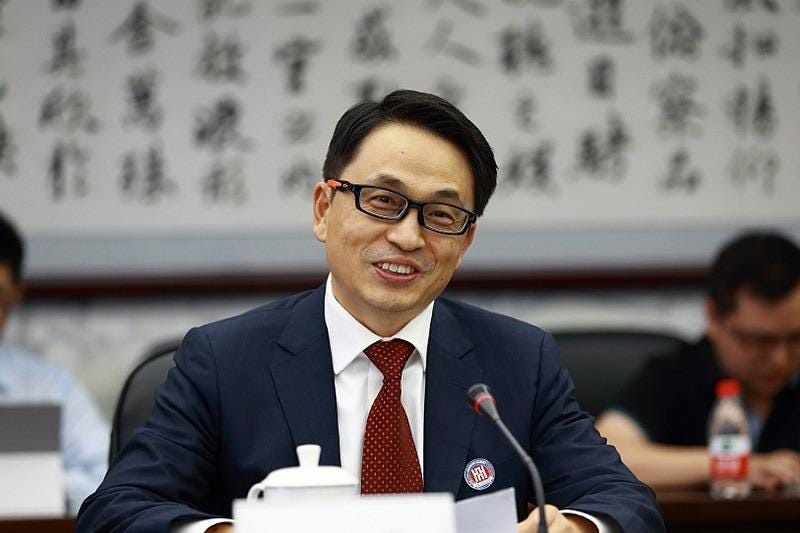




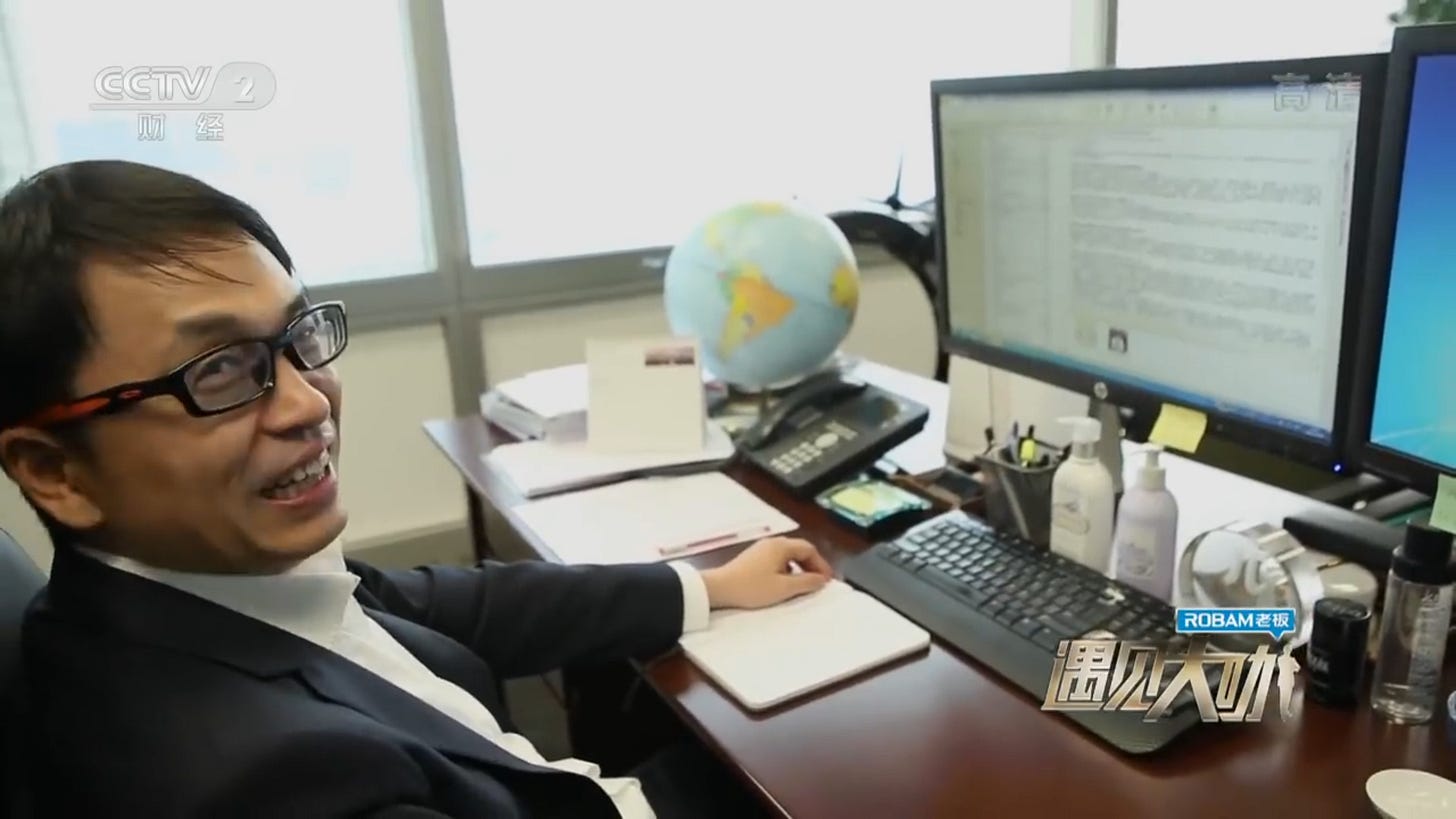
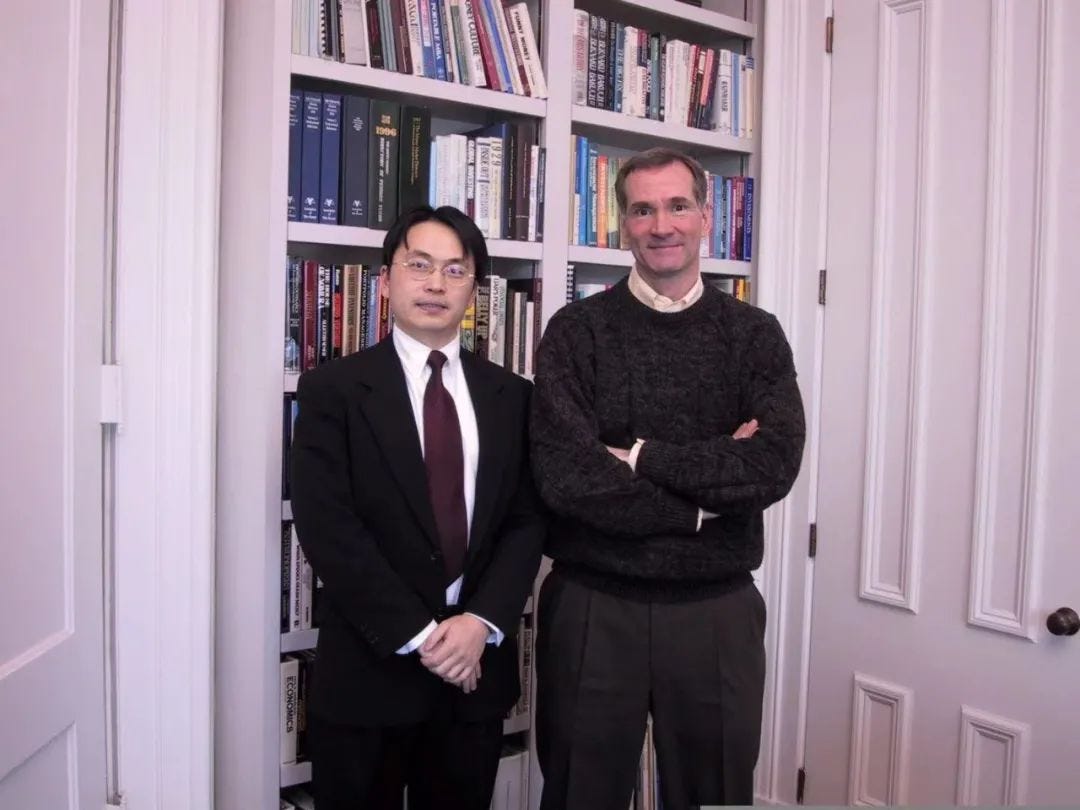




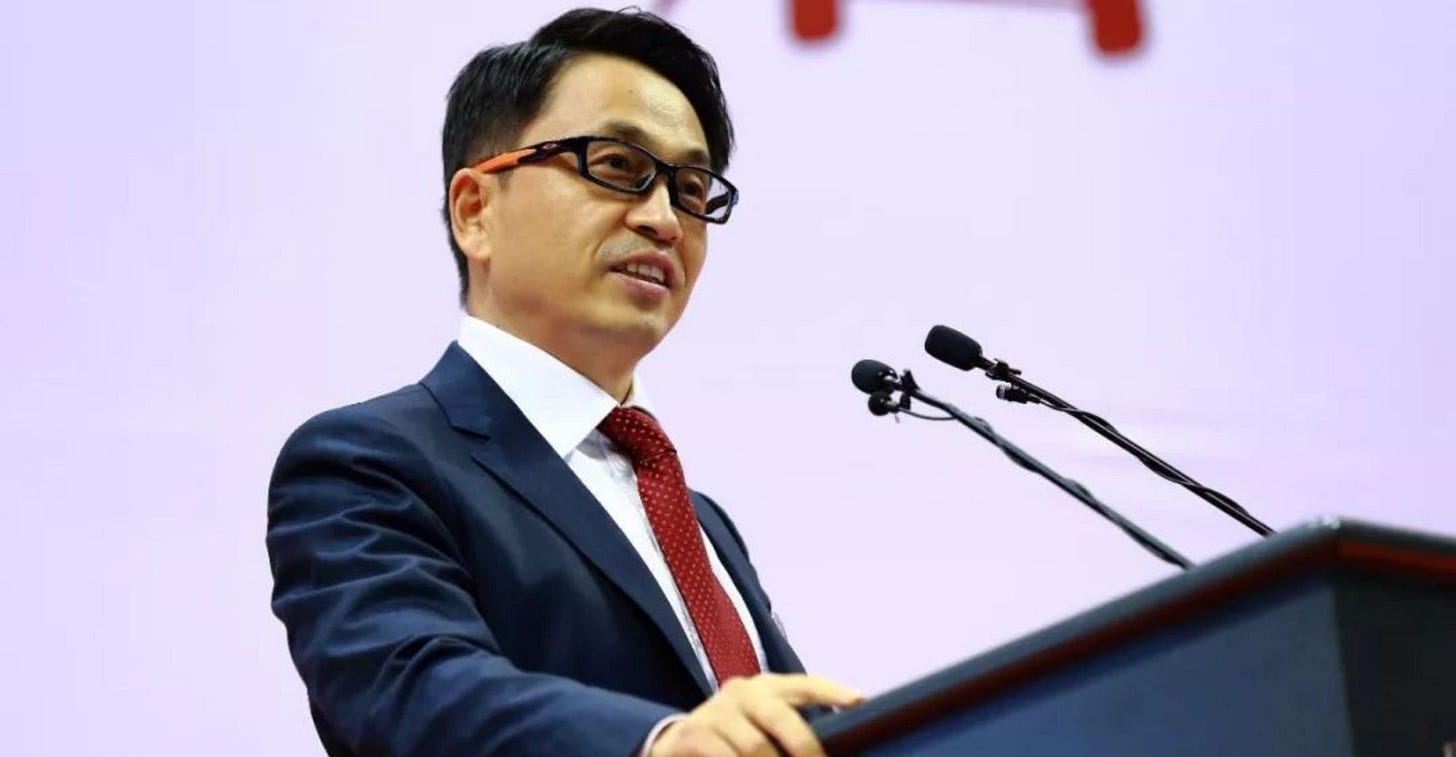


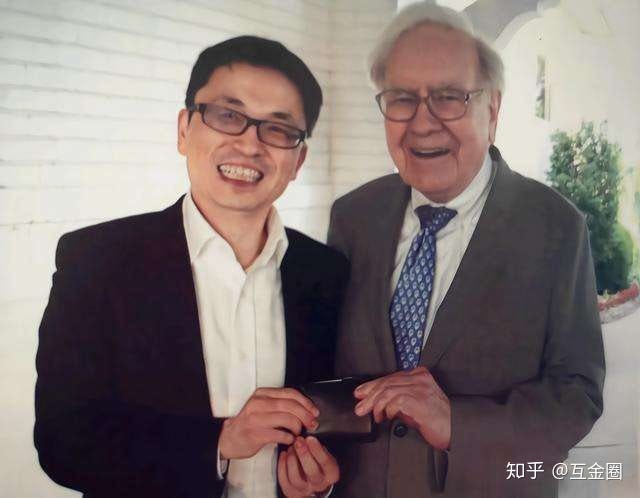
His book Value is a fascinating read, especially as he tracks his career from going to one fo the top university in China, working at SOE, studying abroad at Yale, meeting and working for David Swensen, and then starts Hillhouse. He’s actually been more open in China, but I agree, he’s not very talkative media.